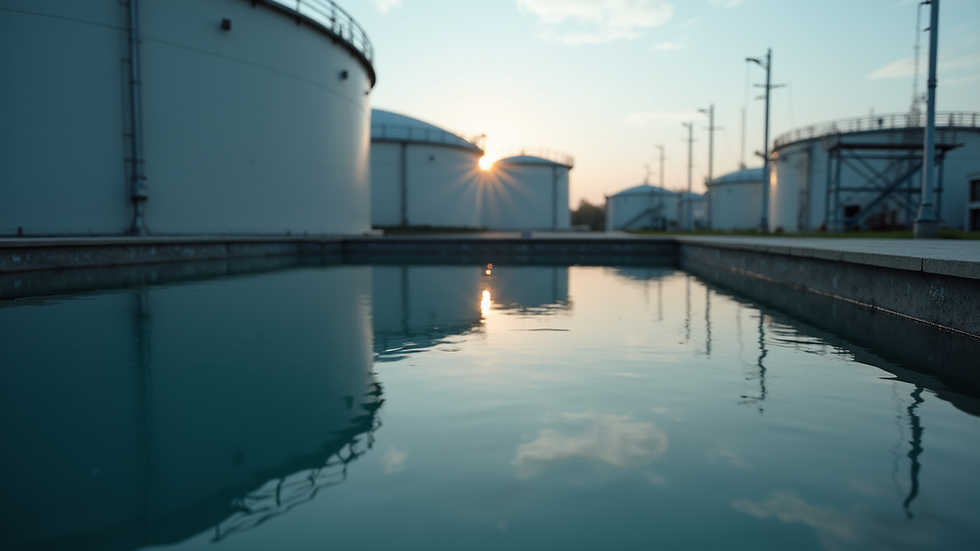Efficient Solutions for Industrial Wastewater Management
- palwinder kaur
- Aug 26, 2025
- 3 min read
Industrial processes generate significant amounts of wastewater that require careful treatment before being released into the environment. Managing this wastewater efficiently is crucial to reduce pollution, conserve water resources, and comply with environmental regulations. This article explores practical and effective industrial waste management methods that industries can adopt to handle their wastewater responsibly.
Key Industrial Waste Management Methods
Industries employ various methods to treat and manage wastewater depending on the type of contaminants and the volume of water involved. Some of the most common and effective industrial waste management methods include:
1. Physical Treatment
Physical treatment involves removing solid particles and suspended matter from wastewater through processes such as sedimentation, filtration, and flotation. These methods are often the first step in wastewater treatment and help reduce the load on subsequent treatment stages.
Sedimentation tanks allow heavy solids to settle at the bottom.
Filtration systems use screens or membranes to trap particles.
Flotation introduces air bubbles to lift oils and grease to the surface for removal.
2. Chemical Treatment
Chemical treatment uses reagents to neutralize harmful substances or precipitate contaminants for easier removal. Common chemical processes include coagulation, flocculation, and neutralization.
Coagulation and flocculation help clump fine particles into larger aggregates.
Neutralization adjusts the pH of acidic or alkaline wastewater to safe levels.
Oxidation breaks down organic pollutants using chemicals like chlorine or ozone.
3. Biological Treatment
Biological treatment leverages microorganisms to degrade organic pollutants naturally. This method is widely used for treating industrial wastewater containing biodegradable materials.
Activated sludge systems aerate wastewater to support microbial growth.
Trickling filters pass wastewater over a bed of media colonized by bacteria.
Anaerobic digesters treat wastewater in oxygen-free environments, producing biogas as a byproduct.
4. Advanced Treatment Technologies
For industries with stringent discharge standards or complex wastewater compositions, advanced treatment technologies are essential.
Membrane filtration (e.g., reverse osmosis) removes dissolved solids and contaminants.
Electrochemical treatment uses electric currents to break down pollutants.
Adsorption employs materials like activated carbon to capture toxins.

What is Industrial Water Management?
Industrial water management refers to the comprehensive strategies and practices used to optimize water use and treat wastewater within industrial facilities. It encompasses water sourcing, usage efficiency, wastewater treatment, and recycling to minimize environmental impact and operational costs.
Effective industrial water management involves:
Water conservation by reducing consumption through process optimization.
Wastewater treatment to meet regulatory standards before discharge.
Water reuse and recycling to reduce freshwater intake and wastewater volume.
Monitoring and control systems to track water quality and usage in real-time.
For example, a textile factory may implement closed-loop water systems that recycle rinse water multiple times, significantly cutting down on water demand and wastewater generation.

Practical Recommendations for Implementing Industrial Waste Management Methods
To achieve efficient wastewater management, industries should consider the following actionable steps:
Conduct a thorough wastewater audit to identify pollutant types and volumes.
Select appropriate treatment technologies based on wastewater characteristics.
Invest in automation and monitoring tools to optimize treatment processes.
Train staff regularly on best practices and safety protocols.
Develop a water reuse plan to maximize resource efficiency.
Engage with environmental experts to ensure compliance and innovation.
By following these steps, industries can reduce their environmental footprint and often realize cost savings through resource recovery and reduced water consumption.
Benefits of Efficient Industrial Waste Management
Adopting efficient industrial waste management methods offers multiple benefits:
Environmental protection by reducing pollution and conserving ecosystems.
Regulatory compliance avoiding fines and legal issues.
Cost savings through reduced water usage and lower treatment expenses.
Improved corporate image demonstrating commitment to sustainability.
Resource recovery such as biogas production or water reuse.
These advantages make investing in modern wastewater treatment technologies a smart choice for industries aiming for long-term sustainability.

Efficient industrial wastewater management is a critical component of sustainable industrial operations. By adopting the right combination of treatment methods and management strategies, industries can protect the environment, comply with regulations, and optimize their resource use. The future of industrial wastewater treatment lies in innovation, integration, and continuous improvement.



Comments